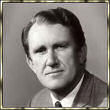

Malcolm Fraser was Australia's 27th Prime Minister.
Born in Melbourne into wealthy grazier family, Fraser managed his family's property in western Victoria; he won the federal seat of Wannon in 1955. By the mid 1960s he was one of the key figures in the Liberal Party, holding a number of portfolios. He replaced Billy Snedden as Liberal leader in 1975.
He was instrumental in bringing about the blocking of supply by the Senate and the following constitutional crisis in which the governor-general, Sir John Kerr, dismissed Mr Whitlam and dissolved both houses of parliament. At the subsequent election in 1975 the coalition parties won a record majority and won further elections in 1977 and 1980.
With a policy of fighting inflation first, his government tried to reduce the federal deficit and stimulate private industrial activity, dismantling many of Whitlam's reforms. In the 1983 election, Fraser was defeated by the Labor opposition led by Bob Hawke. Mr Fraser resigned from parliament later in 1983.
In 1966 Fraser became a minister for the first time when Harold Holt allocated him the Army portfolio. He was Minister for Education and Science (1968-69) in the government of John Gorton, then Minister for Defence. Gorton's resignation as party leader in 1971 created a Liberal Party crisis in which William McMahon replaced Gorton as Prime Minister.
Fraser was Minister for Education and Science until the 1972 election brought the Labor government of Gough Whitlam into power. He then became the shadow Minister for Industrial Relations. He was the Leader of the Opposition from 21 March to 11 November 1975, when the Governor-General dismissed the Whitlam government.
He began his term as caretaker Prime Minister on 11 November 1975, the Fraser Coalition government was returned with the largest landslide of any federal election a month later, and remained in office until 1983. Nonetheless, the constitutional crisis made its beginning controversial and marked Fraser's prime ministership.
Malcolm Fraser had an important influence on the changing relations of countries within the British Commonwealth, and on shaping Australia's relations with the countries of East and Southeast Asia. Though economic rationalism was introduced in policy debate during his term of office, his government reflected more traditional principles in financial management and fiscal policy.
All Rights Reserved.